Report on Karakuri Startup and Analysis of the UK Legal System
VerifiedAdded on 2022/04/04
|31
|13287
|28
Report
AI Summary
This report, prepared by a paralegal at Clifford Chance, provides a comprehensive overview of the UK legal system, focusing on its structure, sources, and impact on businesses, using Karakuri Company as a case study. The report begins with an introduction to Karakuri, a food production startup, and then delves into the basics of the UK legal system, including its constitutional monarchy and court system. It differentiates between civil and criminal law and explores the sources of UK law, such as written and unwritten law, including Acts of Parliament, common law, equity law, and others. The report also outlines the court system in England and Wales, explaining the roles of different courts like the County Court, High Court, and Court of Appeal. It further clarifies the sources of law in the UK, including common law and equity law, and how they are applied. The report aims to provide a clear understanding of the legal environment in the UK and its effects on business development, with specific reference to the Karakuri startup. This document is contributed by a student and published on Desklib, a platform that provides AI-based study tools for students.
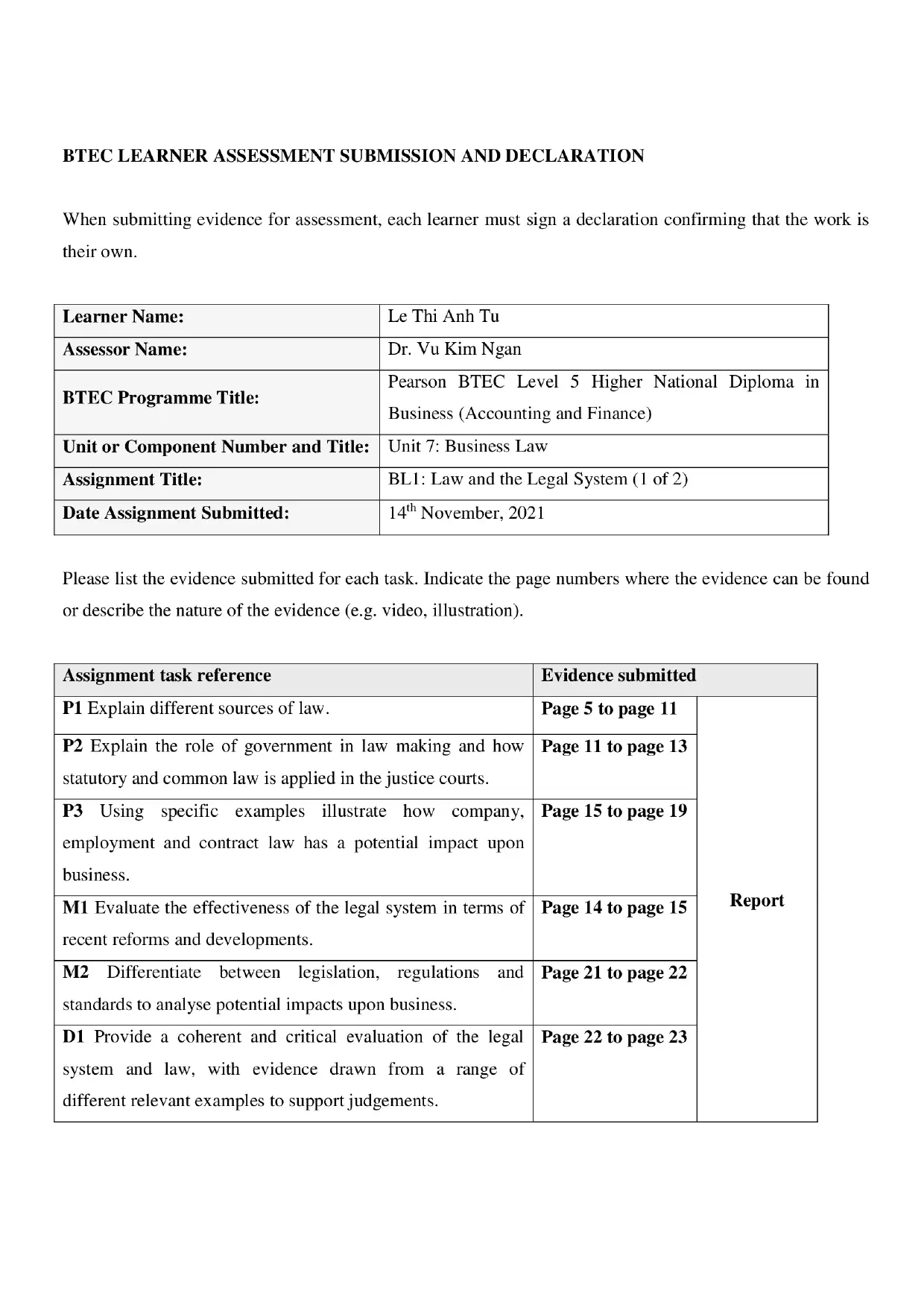
Paraphrase This Document
Need a fresh take? Get an instant paraphrase of this document with our AI Paraphraser
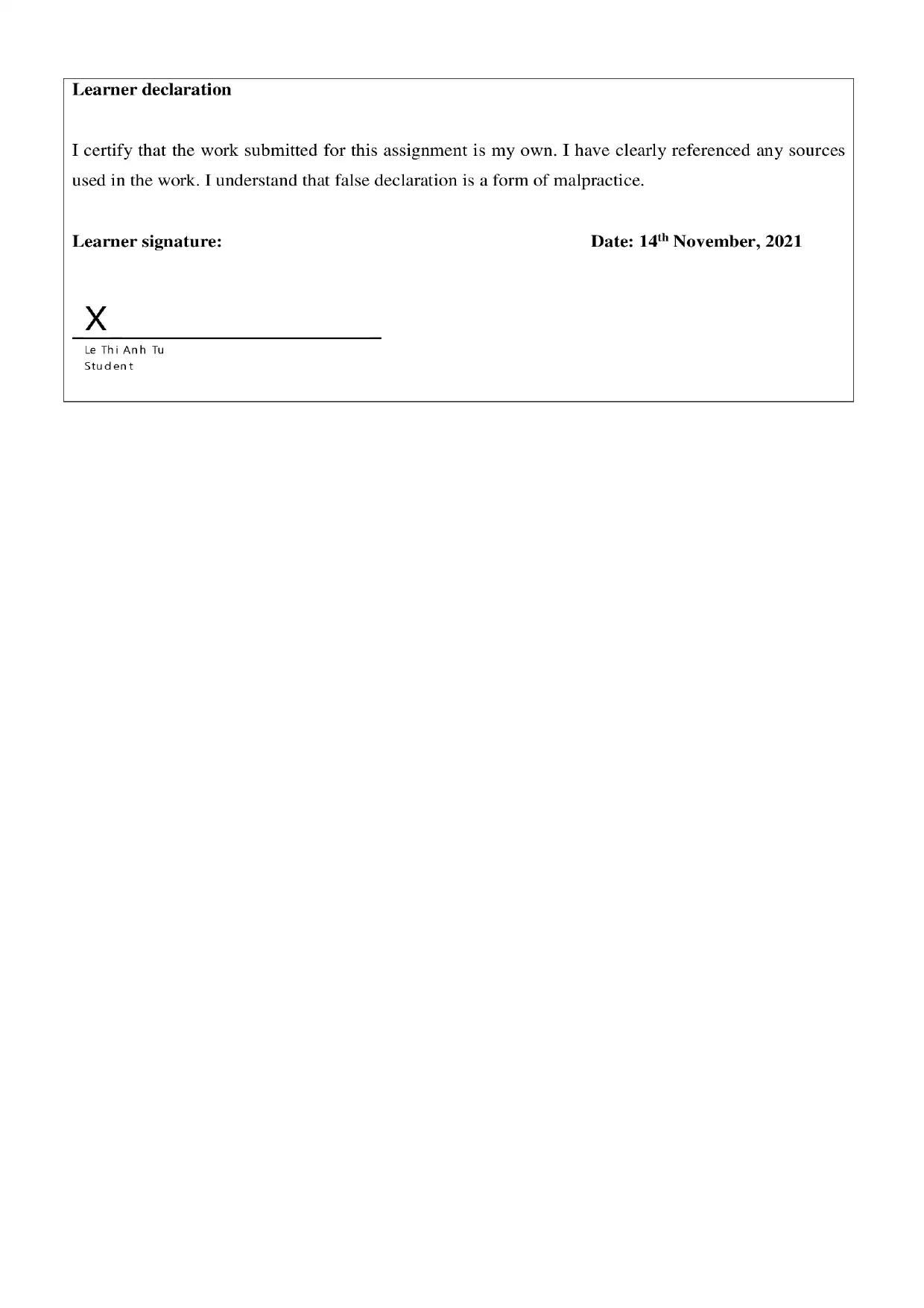
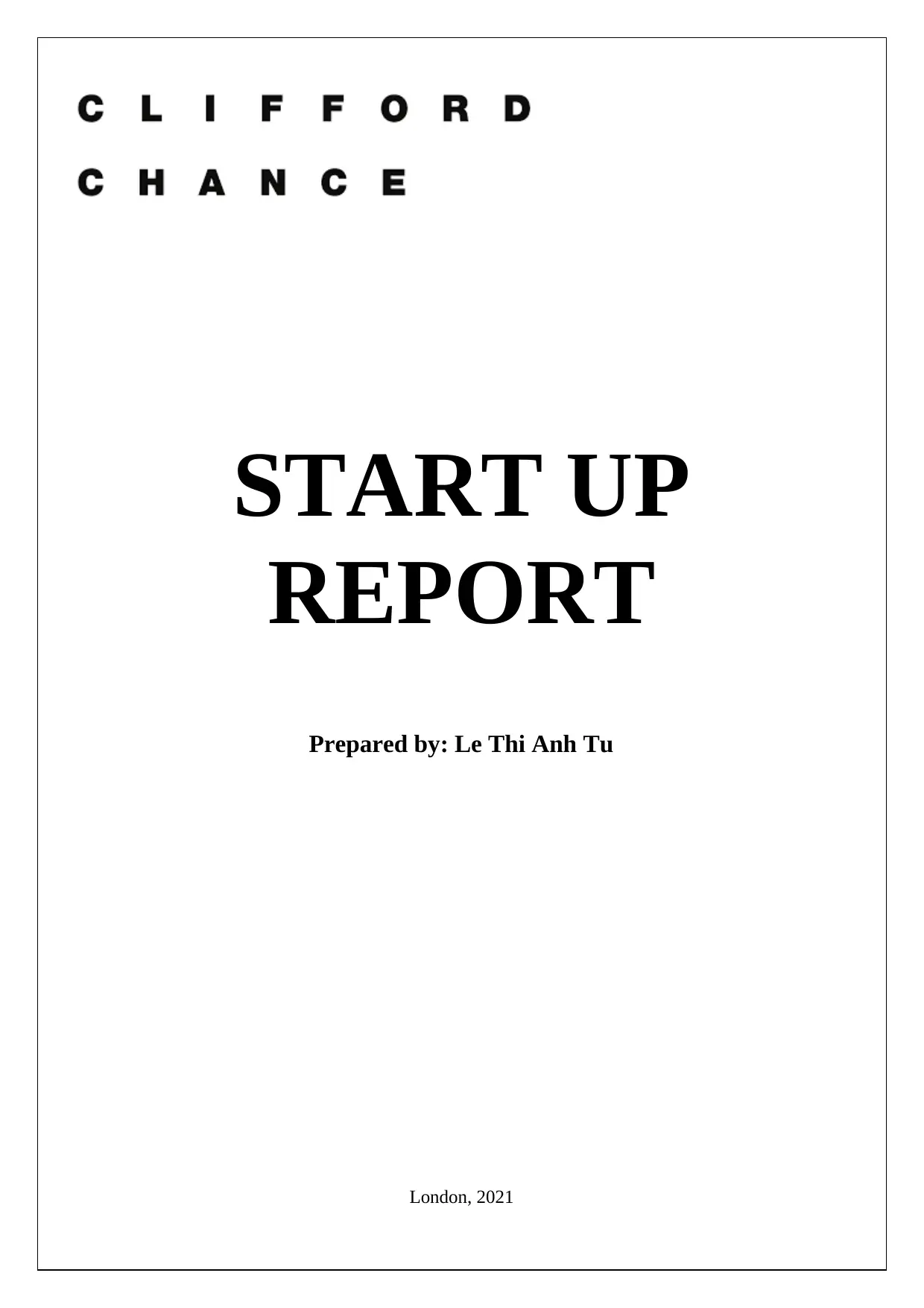
START UP
REPORT
Prepared by: Le Thi Anh Tu
London, 2021
REPORT
Prepared by: Le Thi Anh Tu
London, 2021
⊘ This is a preview!⊘
Do you want full access?
Subscribe today to unlock all pages.

Trusted by 1+ million students worldwide
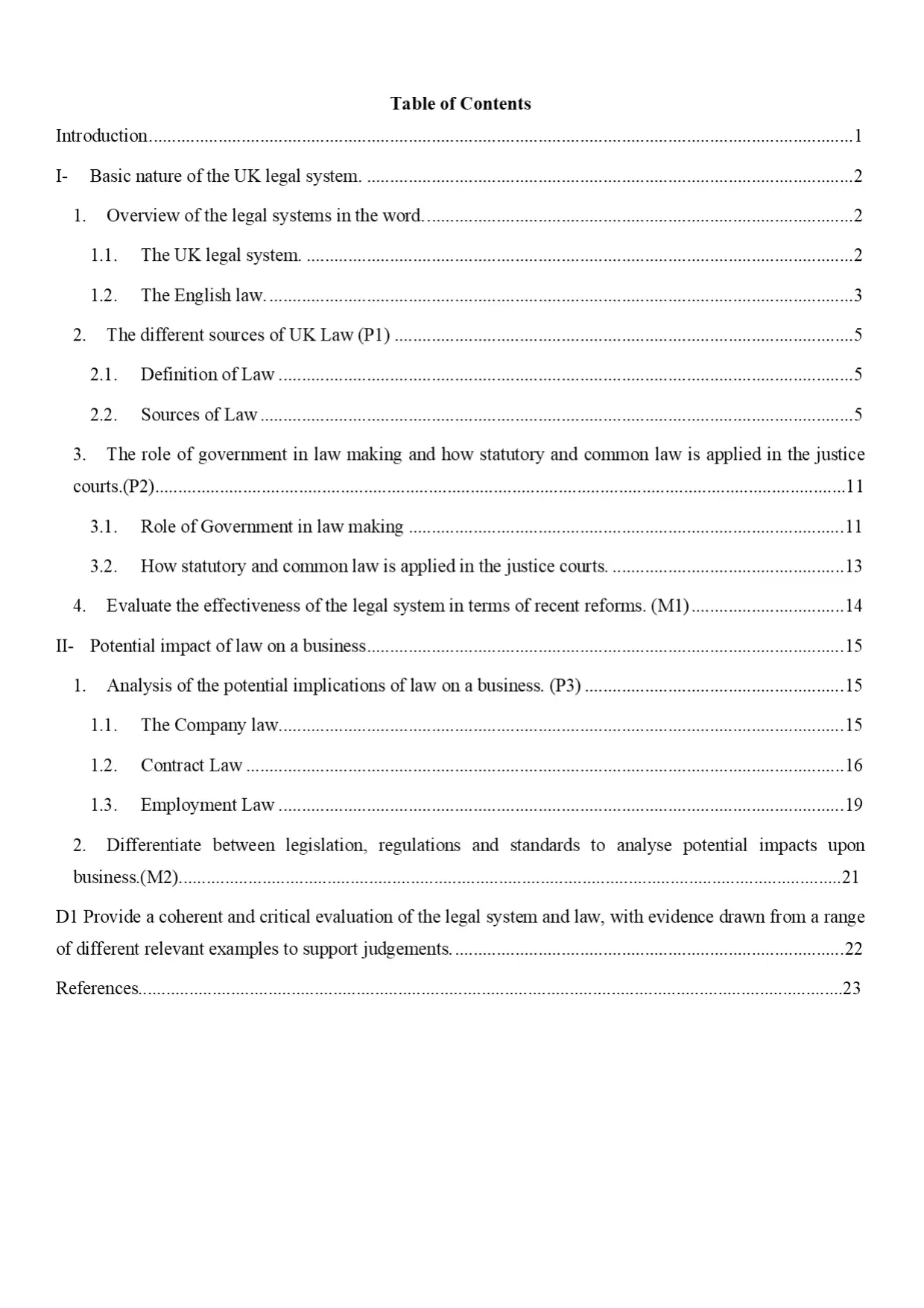
Paraphrase This Document
Need a fresh take? Get an instant paraphrase of this document with our AI Paraphraser
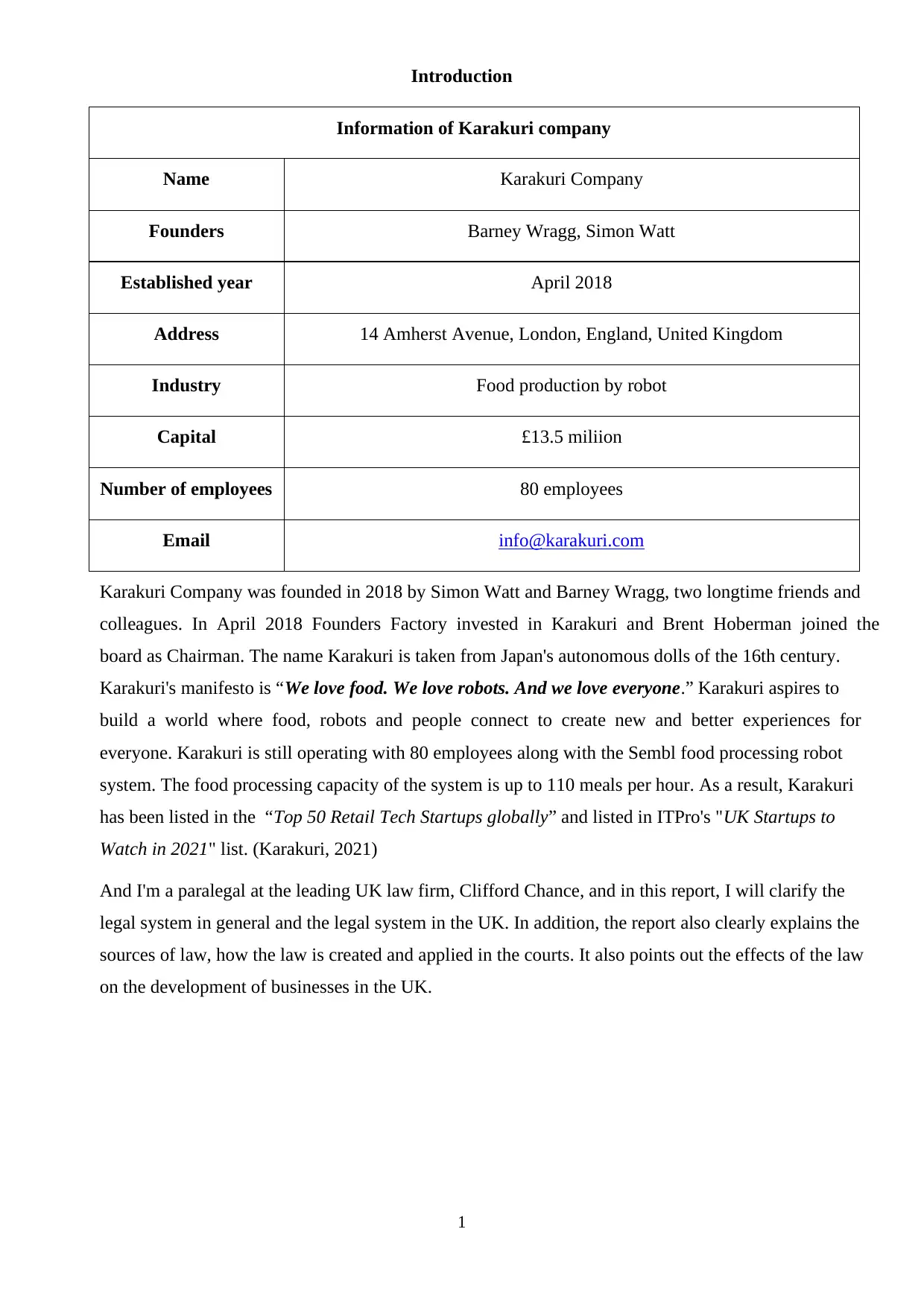
1
Introduction
Information of Karakuri company
Name Karakuri Company
Founders Barney Wragg, Simon Watt
Established year April 2018
Address 14 Amherst Avenue, London, England, United Kingdom
Industry Food production by robot
Capital £13.5 miliion
Number of employees 80 employees
Email info@karakuri.com
Karakuri Company was founded in 2018 by Simon Watt and Barney Wragg, two longtime friends and
colleagues. In April 2018 Founders Factory invested in Karakuri and Brent Hoberman joined the
board as Chairman. The name Karakuri is taken from Japan's autonomous dolls of the 16th century.
Karakuri's manifesto is “We love food. We love robots. And we love everyone.” Karakuri aspires to
build a world where food, robots and people connect to create new and better experiences for
everyone. Karakuri is still operating with 80 employees along with the Sembl food processing robot
system. The food processing capacity of the system is up to 110 meals per hour. As a result, Karakuri
has been listed in the “Top 50 Retail Tech Startups globally” and listed in ITPro's "UK Startups to
Watch in 2021" list. (Karakuri, 2021)
And I'm a paralegal at the leading UK law firm, Clifford Chance, and in this report, I will clarify the
legal system in general and the legal system in the UK. In addition, the report also clearly explains the
sources of law, how the law is created and applied in the courts. It also points out the effects of the law
on the development of businesses in the UK.
Introduction
Information of Karakuri company
Name Karakuri Company
Founders Barney Wragg, Simon Watt
Established year April 2018
Address 14 Amherst Avenue, London, England, United Kingdom
Industry Food production by robot
Capital £13.5 miliion
Number of employees 80 employees
Email info@karakuri.com
Karakuri Company was founded in 2018 by Simon Watt and Barney Wragg, two longtime friends and
colleagues. In April 2018 Founders Factory invested in Karakuri and Brent Hoberman joined the
board as Chairman. The name Karakuri is taken from Japan's autonomous dolls of the 16th century.
Karakuri's manifesto is “We love food. We love robots. And we love everyone.” Karakuri aspires to
build a world where food, robots and people connect to create new and better experiences for
everyone. Karakuri is still operating with 80 employees along with the Sembl food processing robot
system. The food processing capacity of the system is up to 110 meals per hour. As a result, Karakuri
has been listed in the “Top 50 Retail Tech Startups globally” and listed in ITPro's "UK Startups to
Watch in 2021" list. (Karakuri, 2021)
And I'm a paralegal at the leading UK law firm, Clifford Chance, and in this report, I will clarify the
legal system in general and the legal system in the UK. In addition, the report also clearly explains the
sources of law, how the law is created and applied in the courts. It also points out the effects of the law
on the development of businesses in the UK.
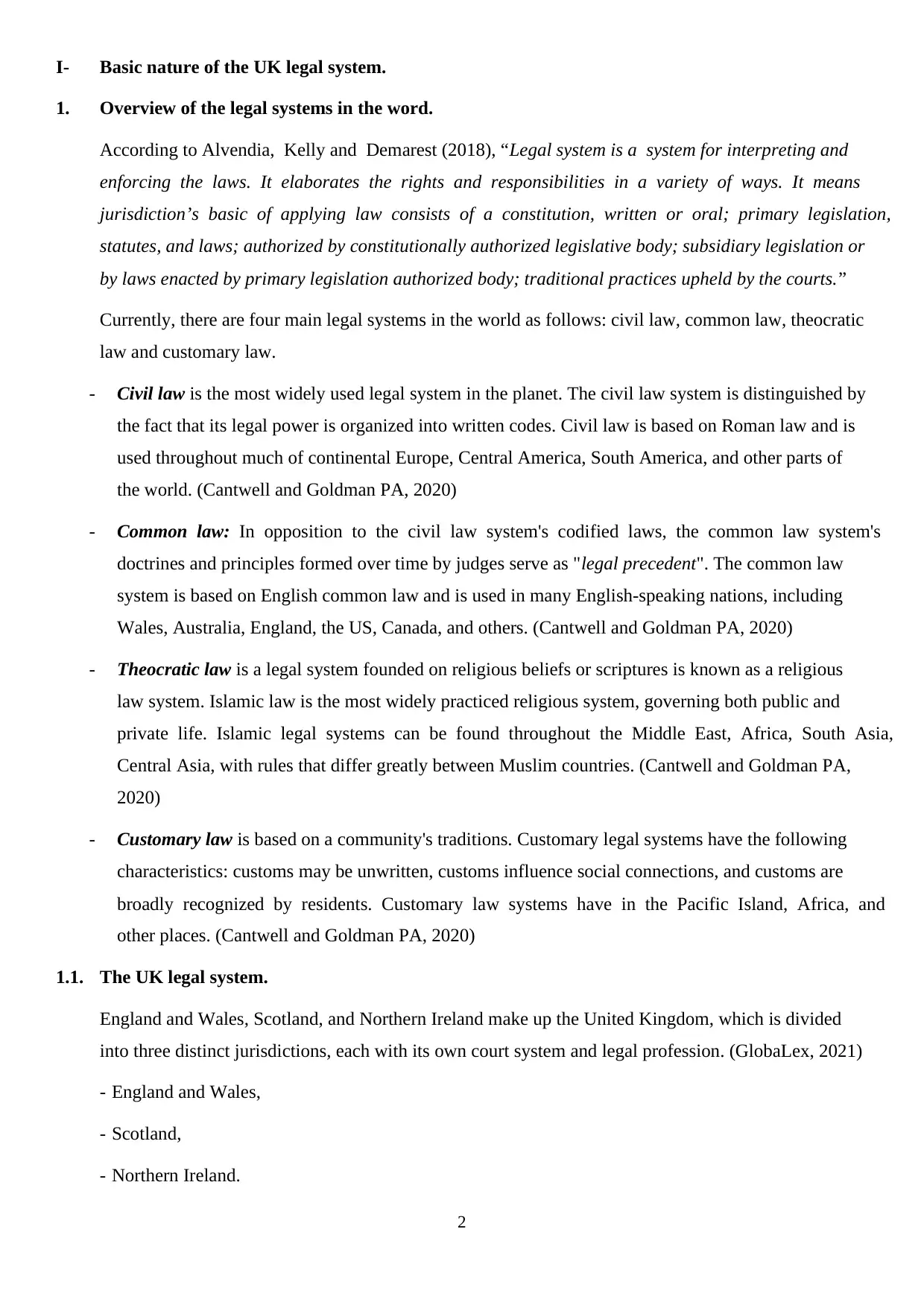
2
I- Basic nature of the UK legal system.
1. Overview of the legal systems in the word.
According to Alvendia, Kelly and Demarest (2018), “Legal system is a system for interpreting and
enforcing the laws. It elaborates the rights and responsibilities in a variety of ways. It means
jurisdiction’s basic of applying law consists of a constitution, written or oral; primary legislation,
statutes, and laws; authorized by constitutionally authorized legislative body; subsidiary legislation or
by laws enacted by primary legislation authorized body; traditional practices upheld by the courts.”
Currently, there are four main legal systems in the world as follows: civil law, common law, theocratic
law and customary law.
- Civil law is the most widely used legal system in the planet. The civil law system is distinguished by
the fact that its legal power is organized into written codes. Civil law is based on Roman law and is
used throughout much of continental Europe, Central America, South America, and other parts of
the world. (Cantwell and Goldman PA, 2020)
- Common law: In opposition to the civil law system's codified laws, the common law system's
doctrines and principles formed over time by judges serve as "legal precedent". The common law
system is based on English common law and is used in many English-speaking nations, including
Wales, Australia, England, the US, Canada, and others. (Cantwell and Goldman PA, 2020)
- Theocratic law is a legal system founded on religious beliefs or scriptures is known as a religious
law system. Islamic law is the most widely practiced religious system, governing both public and
private life. Islamic legal systems can be found throughout the Middle East, Africa, South Asia,
Central Asia, with rules that differ greatly between Muslim countries. (Cantwell and Goldman PA,
2020)
- Customary law is based on a community's traditions. Customary legal systems have the following
characteristics: customs may be unwritten, customs influence social connections, and customs are
broadly recognized by residents. Customary law systems have in the Pacific Island, Africa, and
other places. (Cantwell and Goldman PA, 2020)
1.1. The UK legal system.
England and Wales, Scotland, and Northern Ireland make up the United Kingdom, which is divided
into three distinct jurisdictions, each with its own court system and legal profession. (GlobaLex, 2021)
- England and Wales,
- Scotland,
- Northern Ireland.
I- Basic nature of the UK legal system.
1. Overview of the legal systems in the word.
According to Alvendia, Kelly and Demarest (2018), “Legal system is a system for interpreting and
enforcing the laws. It elaborates the rights and responsibilities in a variety of ways. It means
jurisdiction’s basic of applying law consists of a constitution, written or oral; primary legislation,
statutes, and laws; authorized by constitutionally authorized legislative body; subsidiary legislation or
by laws enacted by primary legislation authorized body; traditional practices upheld by the courts.”
Currently, there are four main legal systems in the world as follows: civil law, common law, theocratic
law and customary law.
- Civil law is the most widely used legal system in the planet. The civil law system is distinguished by
the fact that its legal power is organized into written codes. Civil law is based on Roman law and is
used throughout much of continental Europe, Central America, South America, and other parts of
the world. (Cantwell and Goldman PA, 2020)
- Common law: In opposition to the civil law system's codified laws, the common law system's
doctrines and principles formed over time by judges serve as "legal precedent". The common law
system is based on English common law and is used in many English-speaking nations, including
Wales, Australia, England, the US, Canada, and others. (Cantwell and Goldman PA, 2020)
- Theocratic law is a legal system founded on religious beliefs or scriptures is known as a religious
law system. Islamic law is the most widely practiced religious system, governing both public and
private life. Islamic legal systems can be found throughout the Middle East, Africa, South Asia,
Central Asia, with rules that differ greatly between Muslim countries. (Cantwell and Goldman PA,
2020)
- Customary law is based on a community's traditions. Customary legal systems have the following
characteristics: customs may be unwritten, customs influence social connections, and customs are
broadly recognized by residents. Customary law systems have in the Pacific Island, Africa, and
other places. (Cantwell and Goldman PA, 2020)
1.1. The UK legal system.
England and Wales, Scotland, and Northern Ireland make up the United Kingdom, which is divided
into three distinct jurisdictions, each with its own court system and legal profession. (GlobaLex, 2021)
- England and Wales,
- Scotland,
- Northern Ireland.
⊘ This is a preview!⊘
Do you want full access?
Subscribe today to unlock all pages.

Trusted by 1+ million students worldwide
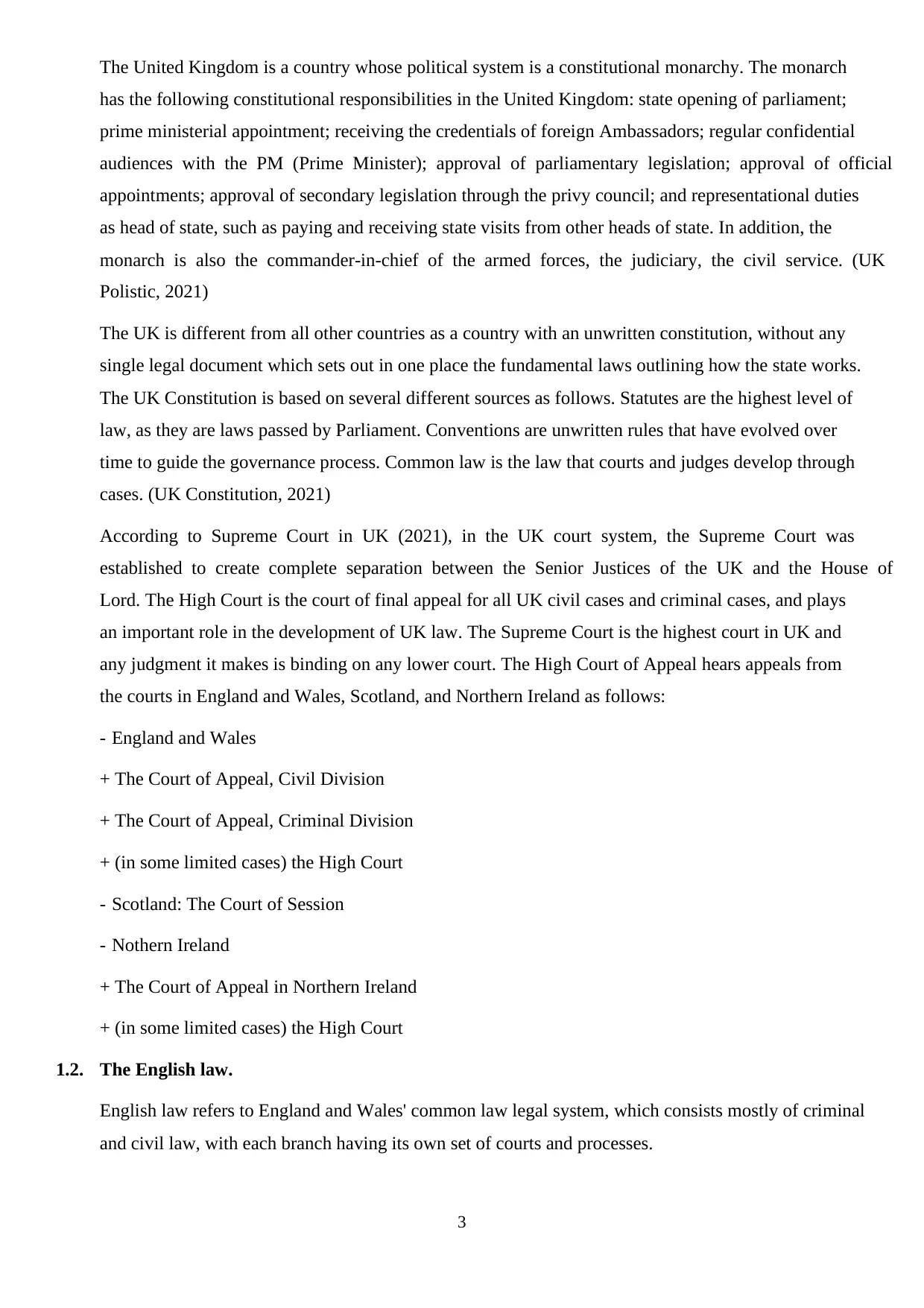
3
The United Kingdom is a country whose political system is a constitutional monarchy. The monarch
has the following constitutional responsibilities in the United Kingdom: state opening of parliament;
prime ministerial appointment; receiving the credentials of foreign Ambassadors; regular confidential
audiences with the PM (Prime Minister); approval of parliamentary legislation; approval of official
appointments; approval of secondary legislation through the privy council; and representational duties
as head of state, such as paying and receiving state visits from other heads of state. In addition, the
monarch is also the commander-in-chief of the armed forces, the judiciary, the civil service. (UK
Polistic, 2021)
The UK is different from all other countries as a country with an unwritten constitution, without any
single legal document which sets out in one place the fundamental laws outlining how the state works.
The UK Constitution is based on several different sources as follows. Statutes are the highest level of
law, as they are laws passed by Parliament. Conventions are unwritten rules that have evolved over
time to guide the governance process. Common law is the law that courts and judges develop through
cases. (UK Constitution, 2021)
According to Supreme Court in UK (2021), in the UK court system, the Supreme Court was
established to create complete separation between the Senior Justices of the UK and the House of
Lord. The High Court is the court of final appeal for all UK civil cases and criminal cases, and plays
an important role in the development of UK law. The Supreme Court is the highest court in UK and
any judgment it makes is binding on any lower court. The High Court of Appeal hears appeals from
the courts in England and Wales, Scotland, and Northern Ireland as follows:
- England and Wales
+ The Court of Appeal, Civil Division
+ The Court of Appeal, Criminal Division
+ (in some limited cases) the High Court
- Scotland: The Court of Session
- Nothern Ireland
+ The Court of Appeal in Northern Ireland
+ (in some limited cases) the High Court
1.2. The English law.
English law refers to England and Wales' common law legal system, which consists mostly of criminal
and civil law, with each branch having its own set of courts and processes.
The United Kingdom is a country whose political system is a constitutional monarchy. The monarch
has the following constitutional responsibilities in the United Kingdom: state opening of parliament;
prime ministerial appointment; receiving the credentials of foreign Ambassadors; regular confidential
audiences with the PM (Prime Minister); approval of parliamentary legislation; approval of official
appointments; approval of secondary legislation through the privy council; and representational duties
as head of state, such as paying and receiving state visits from other heads of state. In addition, the
monarch is also the commander-in-chief of the armed forces, the judiciary, the civil service. (UK
Polistic, 2021)
The UK is different from all other countries as a country with an unwritten constitution, without any
single legal document which sets out in one place the fundamental laws outlining how the state works.
The UK Constitution is based on several different sources as follows. Statutes are the highest level of
law, as they are laws passed by Parliament. Conventions are unwritten rules that have evolved over
time to guide the governance process. Common law is the law that courts and judges develop through
cases. (UK Constitution, 2021)
According to Supreme Court in UK (2021), in the UK court system, the Supreme Court was
established to create complete separation between the Senior Justices of the UK and the House of
Lord. The High Court is the court of final appeal for all UK civil cases and criminal cases, and plays
an important role in the development of UK law. The Supreme Court is the highest court in UK and
any judgment it makes is binding on any lower court. The High Court of Appeal hears appeals from
the courts in England and Wales, Scotland, and Northern Ireland as follows:
- England and Wales
+ The Court of Appeal, Civil Division
+ The Court of Appeal, Criminal Division
+ (in some limited cases) the High Court
- Scotland: The Court of Session
- Nothern Ireland
+ The Court of Appeal in Northern Ireland
+ (in some limited cases) the High Court
1.2. The English law.
English law refers to England and Wales' common law legal system, which consists mostly of criminal
and civil law, with each branch having its own set of courts and processes.
Paraphrase This Document
Need a fresh take? Get an instant paraphrase of this document with our AI Paraphraser
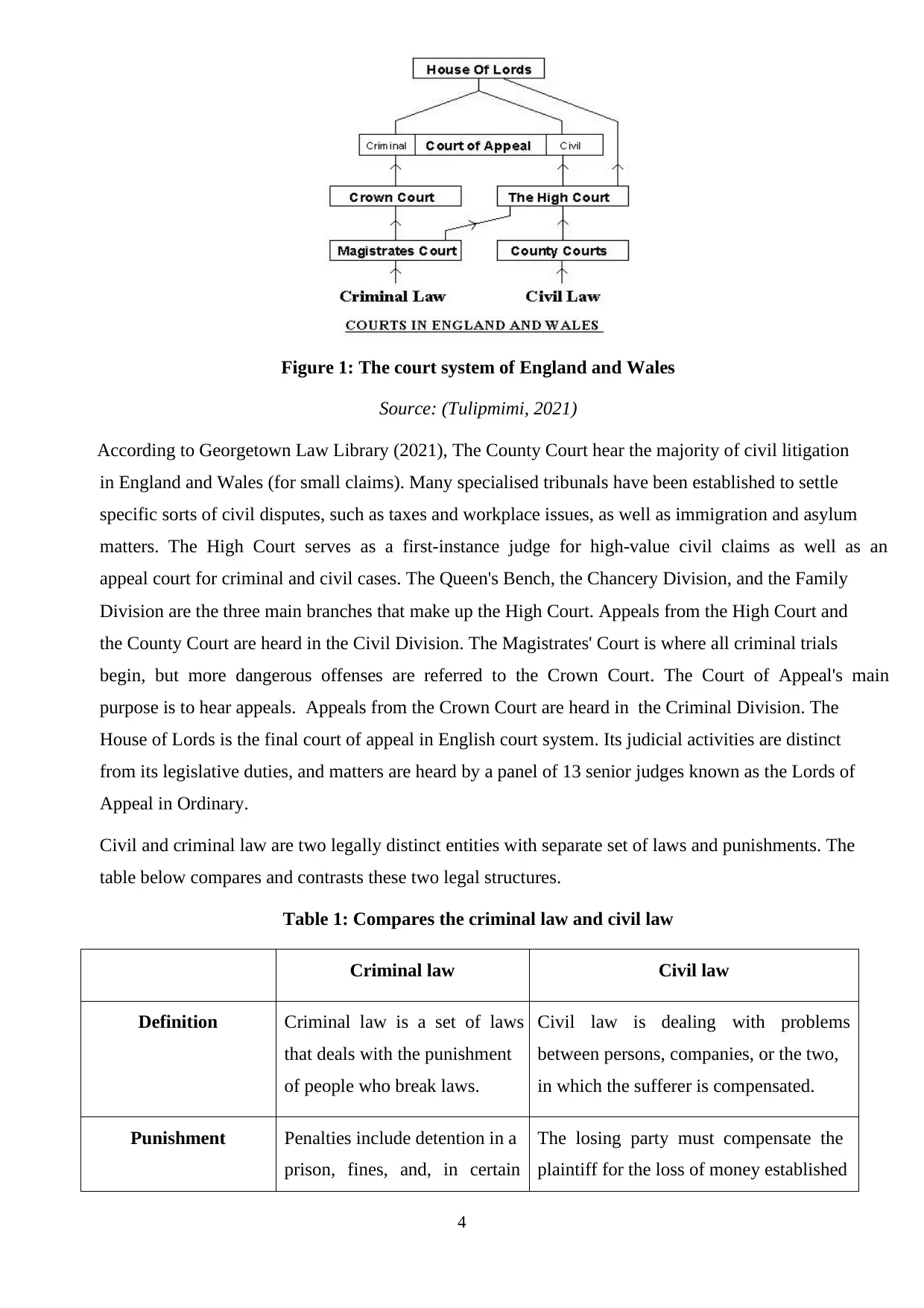
4
Figure 1: The court system of England and Wales
Source: (Tulipmimi, 2021)
“According to Georgetown Law Library (2021), The County Court hear the majority of civil litigation
in England and Wales (for small claims). Many specialised tribunals have been established to settle
specific sorts of civil disputes, such as taxes and workplace issues, as well as immigration and asylum
matters. The High Court serves as a first-instance judge for high-value civil claims as well as an
appeal court for criminal and civil cases. The Queen's Bench, the Chancery Division, and the Family
Division are the three main branches that make up the High Court. Appeals from the High Court and
the County Court are heard in the Civil Division. The Magistrates' Court is where all criminal trials
begin, but more dangerous offenses are referred to the Crown Court. The Court of Appeal's main
purpose is to hear appeals. Appeals from the Crown Court are heard in the Criminal Division. The
House of Lords is the final court of appeal in English court system. Its judicial activities are distinct
from its legislative duties, and matters are heard by a panel of 13 senior judges known as the Lords of
Appeal in Ordinary.”
Civil and criminal law are two legally distinct entities with separate set of laws and punishments. The
table below compares and contrasts these two legal structures.
Table 1: Compares the criminal law and civil law
Criminal law Civil law
Definition Criminal law is a set of laws
that deals with the punishment
of people who break laws.
Civil law is dealing with problems
between persons, companies, or the two,
in which the sufferer is compensated.
Punishment Penalties include detention in a
prison, fines, and, in certain
The losing party must compensate the
plaintiff for the loss of money established
Figure 1: The court system of England and Wales
Source: (Tulipmimi, 2021)
“According to Georgetown Law Library (2021), The County Court hear the majority of civil litigation
in England and Wales (for small claims). Many specialised tribunals have been established to settle
specific sorts of civil disputes, such as taxes and workplace issues, as well as immigration and asylum
matters. The High Court serves as a first-instance judge for high-value civil claims as well as an
appeal court for criminal and civil cases. The Queen's Bench, the Chancery Division, and the Family
Division are the three main branches that make up the High Court. Appeals from the High Court and
the County Court are heard in the Civil Division. The Magistrates' Court is where all criminal trials
begin, but more dangerous offenses are referred to the Crown Court. The Court of Appeal's main
purpose is to hear appeals. Appeals from the Crown Court are heard in the Criminal Division. The
House of Lords is the final court of appeal in English court system. Its judicial activities are distinct
from its legislative duties, and matters are heard by a panel of 13 senior judges known as the Lords of
Appeal in Ordinary.”
Civil and criminal law are two legally distinct entities with separate set of laws and punishments. The
table below compares and contrasts these two legal structures.
Table 1: Compares the criminal law and civil law
Criminal law Civil law
Definition Criminal law is a set of laws
that deals with the punishment
of people who break laws.
Civil law is dealing with problems
between persons, companies, or the two,
in which the sufferer is compensated.
Punishment Penalties include detention in a
prison, fines, and, in certain
The losing party must compensate the
plaintiff for the loss of money established
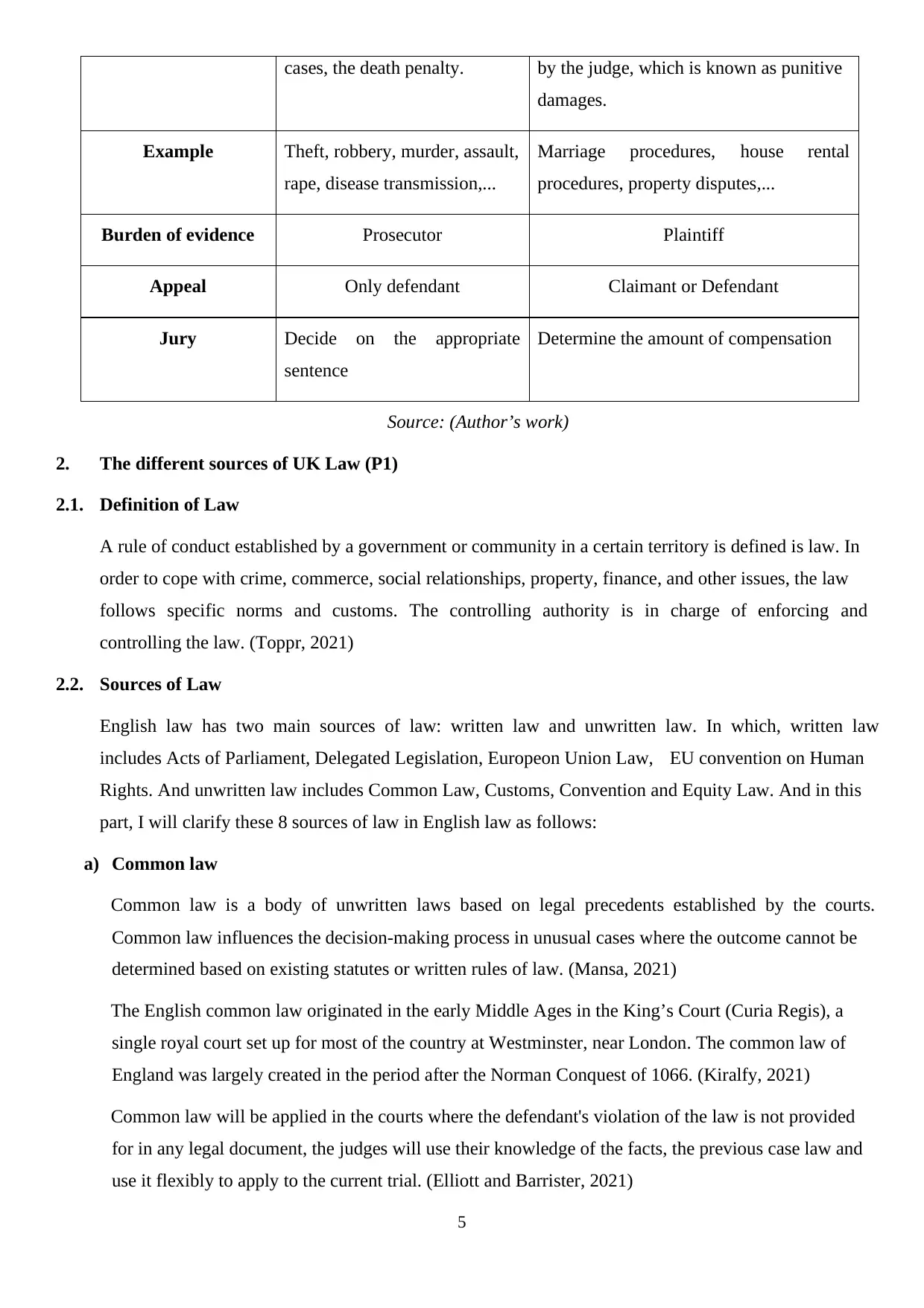
5
cases, the death penalty. by the judge, which is known as punitive
damages.
Example Theft, robbery, murder, assault,
rape, disease transmission,...
Marriage procedures, house rental
procedures, property disputes,...
Burden of evidence Prosecutor Plaintiff
Appeal Only defendant Claimant or Defendant
Jury Decide on the appropriate
sentence
Determine the amount of compensation
Source: (Author’s work)
2. The different sources of UK Law (P1)
2.1. Definition of Law
A rule of conduct established by a government or community in a certain territory is defined is law. In
order to cope with crime, commerce, social relationships, property, finance, and other issues, the law
follows specific norms and customs. The controlling authority is in charge of enforcing and
controlling the law. (Toppr, 2021)
2.2. Sources of Law
English law has two main sources of law: written law and unwritten law. In which, written law
includes Acts of Parliament, Delegated Legislation, Europeon Union Law, EU convention on Human
Rights. And unwritten law includes Common Law, Customs, Convention and Equity Law. And in this
part, I will clarify these 8 sources of law in English law as follows:
a) Common law
Common law is a body of unwritten laws based on legal precedents established by the courts.
Common law influences the decision-making process in unusual cases where the outcome cannot be
determined based on existing statutes or written rules of law. (Mansa, 2021)
The English common law originated in the early Middle Ages in the King’s Court (Curia Regis), a
single royal court set up for most of the country at Westminster, near London. The common law of
England was largely created in the period after the Norman Conquest of 1066. (Kiralfy, 2021)
Common law will be applied in the courts where the defendant's violation of the law is not provided
for in any legal document, the judges will use their knowledge of the facts, the previous case law and
use it flexibly to apply to the current trial. (Elliott and Barrister, 2021)
cases, the death penalty. by the judge, which is known as punitive
damages.
Example Theft, robbery, murder, assault,
rape, disease transmission,...
Marriage procedures, house rental
procedures, property disputes,...
Burden of evidence Prosecutor Plaintiff
Appeal Only defendant Claimant or Defendant
Jury Decide on the appropriate
sentence
Determine the amount of compensation
Source: (Author’s work)
2. The different sources of UK Law (P1)
2.1. Definition of Law
A rule of conduct established by a government or community in a certain territory is defined is law. In
order to cope with crime, commerce, social relationships, property, finance, and other issues, the law
follows specific norms and customs. The controlling authority is in charge of enforcing and
controlling the law. (Toppr, 2021)
2.2. Sources of Law
English law has two main sources of law: written law and unwritten law. In which, written law
includes Acts of Parliament, Delegated Legislation, Europeon Union Law, EU convention on Human
Rights. And unwritten law includes Common Law, Customs, Convention and Equity Law. And in this
part, I will clarify these 8 sources of law in English law as follows:
a) Common law
Common law is a body of unwritten laws based on legal precedents established by the courts.
Common law influences the decision-making process in unusual cases where the outcome cannot be
determined based on existing statutes or written rules of law. (Mansa, 2021)
The English common law originated in the early Middle Ages in the King’s Court (Curia Regis), a
single royal court set up for most of the country at Westminster, near London. The common law of
England was largely created in the period after the Norman Conquest of 1066. (Kiralfy, 2021)
Common law will be applied in the courts where the defendant's violation of the law is not provided
for in any legal document, the judges will use their knowledge of the facts, the previous case law and
use it flexibly to apply to the current trial. (Elliott and Barrister, 2021)
⊘ This is a preview!⊘
Do you want full access?
Subscribe today to unlock all pages.

Trusted by 1+ million students worldwide
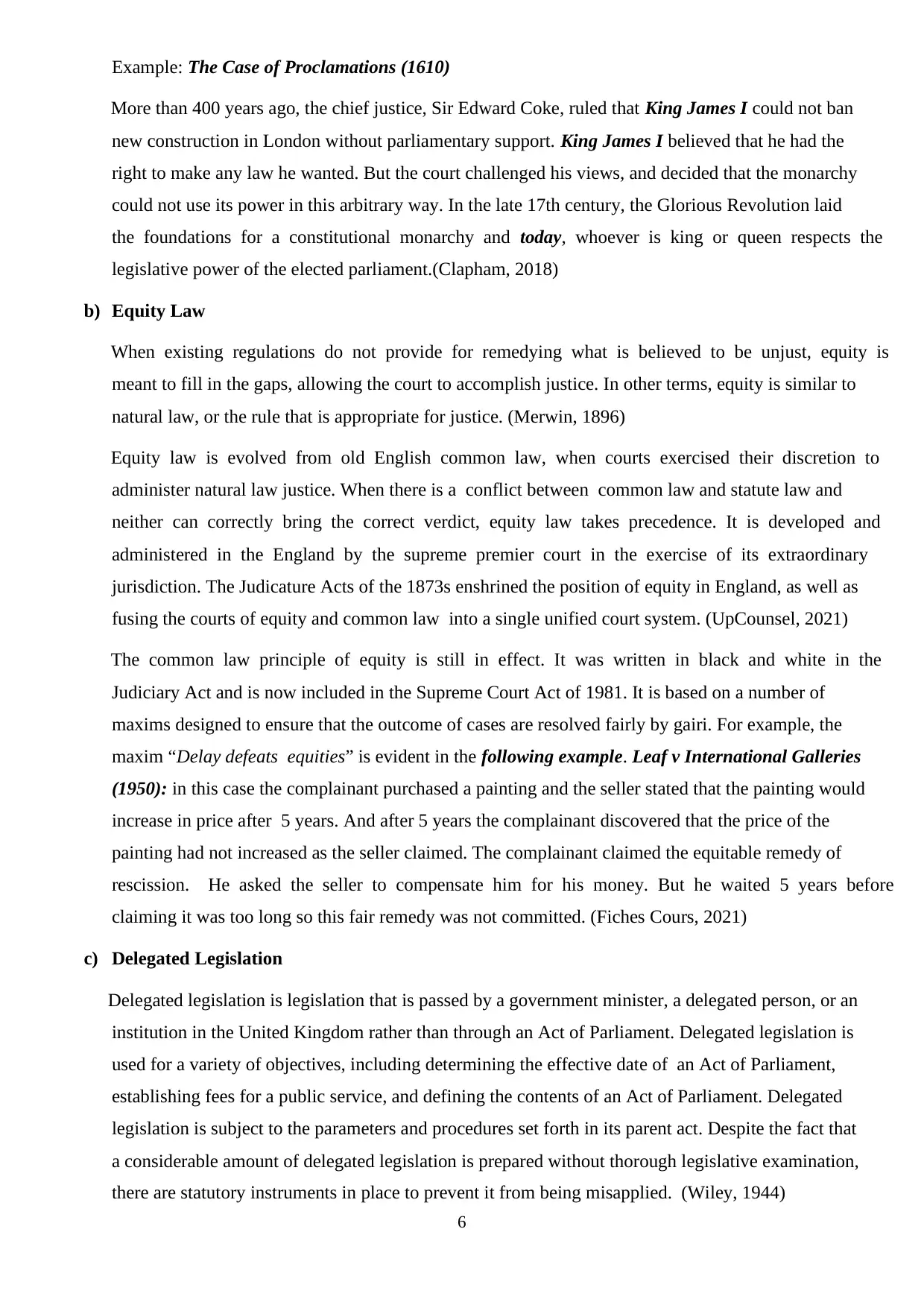
6
Example: The Case of Proclamations (1610)
More than 400 years ago, the chief justice, Sir Edward Coke, ruled that King James I could not ban
new construction in London without parliamentary support. King James I believed that he had the
right to make any law he wanted. But the court challenged his views, and decided that the monarchy
could not use its power in this arbitrary way. In the late 17th century, the Glorious Revolution laid
the foundations for a constitutional monarchy and today, whoever is king or queen respects the
legislative power of the elected parliament.(Clapham, 2018)
b) Equity Law
When existing regulations do not provide for remedying what is believed to be unjust, equity is
meant to fill in the gaps, allowing the court to accomplish justice. In other terms, equity is similar to
natural law, or the rule that is appropriate for justice. (Merwin, 1896)
Equity law is evolved from old English common law, when courts exercised their discretion to
administer natural law justice. When there is a conflict between common law and statute law and
neither can correctly bring the correct verdict, equity law takes precedence. It is developed and
administered in the England by the supreme premier court in the exercise of its extraordinary
jurisdiction. The Judicature Acts of the 1873s enshrined the position of equity in England, as well as
fusing the courts of equity and common law into a single unified court system. (UpCounsel, 2021)
The common law principle of equity is still in effect. It was written in black and white in the
Judiciary Act and is now included in the Supreme Court Act of 1981. It is based on a number of
maxims designed to ensure that the outcome of cases are resolved fairly by gairi. For example, the
maxim “Delay defeats equities” is evident in the following example. Leaf v International Galleries
(1950): in this case the complainant purchased a painting and the seller stated that the painting would
increase in price after 5 years. And after 5 years the complainant discovered that the price of the
painting had not increased as the seller claimed. The complainant claimed the equitable remedy of
rescission. He asked the seller to compensate him for his money. But he waited 5 years before
claiming it was too long so this fair remedy was not committed. (Fiches Cours, 2021)
c) Delegated Legislation
“Delegated legislation is legislation that is passed by a government minister, a delegated person, or an
institution in the United Kingdom rather than through an Act of Parliament. Delegated legislation is
used for a variety of objectives, including determining the effective date of an Act of Parliament,
establishing fees for a public service, and defining the contents of an Act of Parliament. Delegated
legislation is subject to the parameters and procedures set forth in its parent act. Despite the fact that
a considerable amount of delegated legislation is prepared without thorough legislative examination,
there are statutory instruments in place to prevent it from being misapplied.”(Wiley, 1944)
Example: The Case of Proclamations (1610)
More than 400 years ago, the chief justice, Sir Edward Coke, ruled that King James I could not ban
new construction in London without parliamentary support. King James I believed that he had the
right to make any law he wanted. But the court challenged his views, and decided that the monarchy
could not use its power in this arbitrary way. In the late 17th century, the Glorious Revolution laid
the foundations for a constitutional monarchy and today, whoever is king or queen respects the
legislative power of the elected parliament.(Clapham, 2018)
b) Equity Law
When existing regulations do not provide for remedying what is believed to be unjust, equity is
meant to fill in the gaps, allowing the court to accomplish justice. In other terms, equity is similar to
natural law, or the rule that is appropriate for justice. (Merwin, 1896)
Equity law is evolved from old English common law, when courts exercised their discretion to
administer natural law justice. When there is a conflict between common law and statute law and
neither can correctly bring the correct verdict, equity law takes precedence. It is developed and
administered in the England by the supreme premier court in the exercise of its extraordinary
jurisdiction. The Judicature Acts of the 1873s enshrined the position of equity in England, as well as
fusing the courts of equity and common law into a single unified court system. (UpCounsel, 2021)
The common law principle of equity is still in effect. It was written in black and white in the
Judiciary Act and is now included in the Supreme Court Act of 1981. It is based on a number of
maxims designed to ensure that the outcome of cases are resolved fairly by gairi. For example, the
maxim “Delay defeats equities” is evident in the following example. Leaf v International Galleries
(1950): in this case the complainant purchased a painting and the seller stated that the painting would
increase in price after 5 years. And after 5 years the complainant discovered that the price of the
painting had not increased as the seller claimed. The complainant claimed the equitable remedy of
rescission. He asked the seller to compensate him for his money. But he waited 5 years before
claiming it was too long so this fair remedy was not committed. (Fiches Cours, 2021)
c) Delegated Legislation
“Delegated legislation is legislation that is passed by a government minister, a delegated person, or an
institution in the United Kingdom rather than through an Act of Parliament. Delegated legislation is
used for a variety of objectives, including determining the effective date of an Act of Parliament,
establishing fees for a public service, and defining the contents of an Act of Parliament. Delegated
legislation is subject to the parameters and procedures set forth in its parent act. Despite the fact that
a considerable amount of delegated legislation is prepared without thorough legislative examination,
there are statutory instruments in place to prevent it from being misapplied.”(Wiley, 1944)
Paraphrase This Document
Need a fresh take? Get an instant paraphrase of this document with our AI Paraphraser
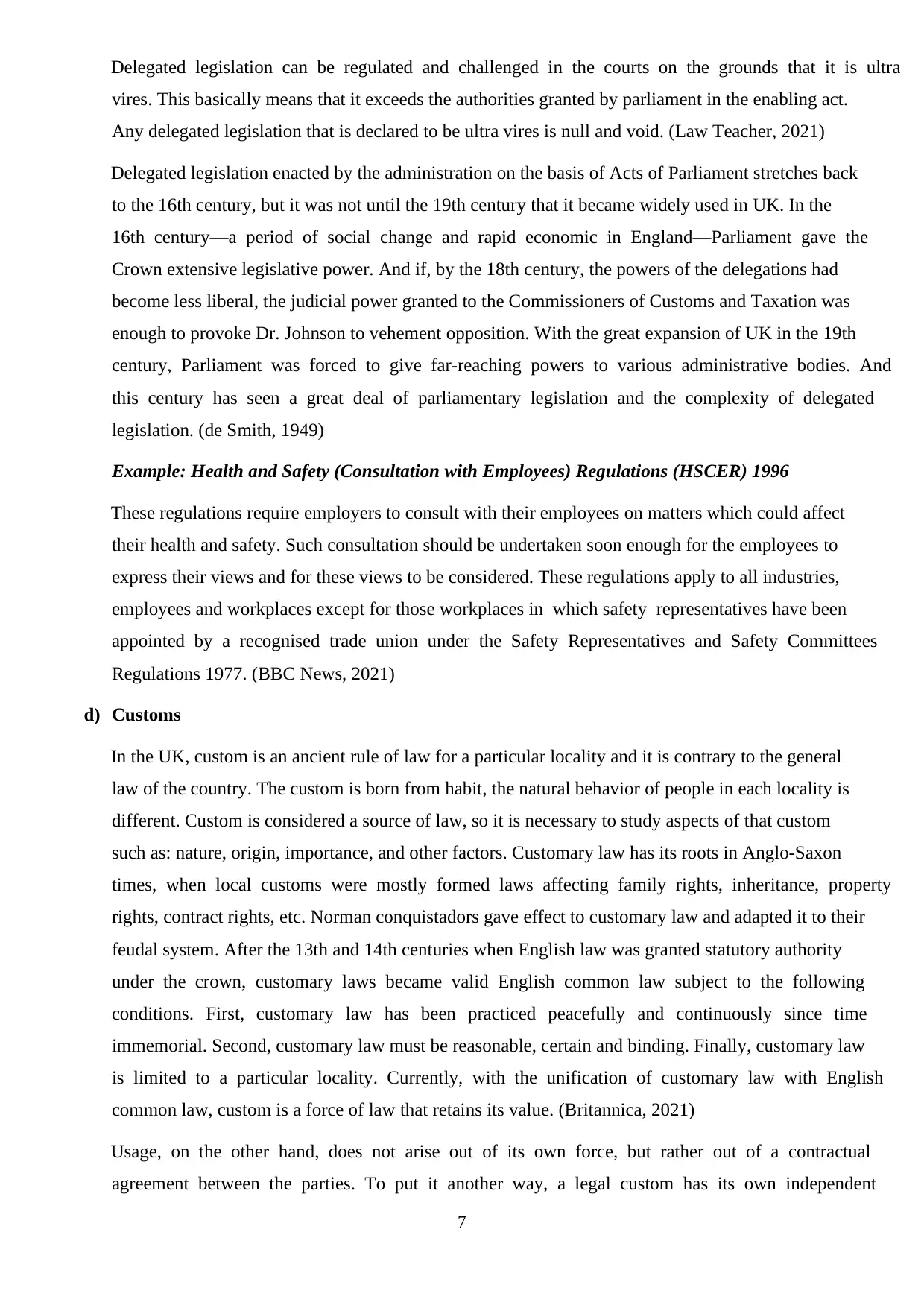
7
Delegated legislation can be regulated and challenged in the courts on the grounds that it is ultra
vires. This basically means that it exceeds the authorities granted by parliament in the enabling act.
Any delegated legislation that is declared to be ultra vires is null and void. (Law Teacher, 2021)
Delegated legislation enacted by the administration on the basis of Acts of Parliament stretches back
to the 16th century, but it was not until the 19th century that it became widely used in UK. In the
16th century—a period of social change and rapid economic in England—Parliament gave the
Crown extensive legislative power. And if, by the 18th century, the powers of the delegations had
become less liberal, the judicial power granted to the Commissioners of Customs and Taxation was
enough to provoke Dr. Johnson to vehement opposition. With the great expansion of UK in the 19th
century, Parliament was forced to give far-reaching powers to various administrative bodies. And
this century has seen a great deal of parliamentary legislation and the complexity of delegated
legislation. (de Smith, 1949)
Example: Health and Safety (Consultation with Employees) Regulations (HSCER) 1996
These regulations require employers to consult with their employees on matters which could affect
their health and safety. Such consultation should be undertaken soon enough for the employees to
express their views and for these views to be considered. These regulations apply to all industries,
employees and workplaces except for those workplaces in which safety representatives have been
appointed by a recognised trade union under the Safety Representatives and Safety Committees
Regulations 1977. (BBC News, 2021)
d) Customs
In the UK, custom is an ancient rule of law for a particular locality and it is contrary to the general
law of the country. The custom is born from habit, the natural behavior of people in each locality is
different. Custom is considered a source of law, so it is necessary to study aspects of that custom
such as: nature, origin, importance, and other factors. Customary law has its roots in Anglo-Saxon
times, when local customs were mostly formed laws affecting family rights, inheritance, property
rights, contract rights, etc. Norman conquistadors gave effect to customary law and adapted it to their
feudal system. After the 13th and 14th centuries when English law was granted statutory authority
under the crown, customary laws became valid English common law subject to the following
conditions. First, customary law has been practiced peacefully and continuously since time
immemorial. Second, customary law must be reasonable, certain and binding. Finally, customary law
is limited to a particular locality. Currently, with the unification of customary law with English
common law, custom is a force of law that retains its value. (Britannica, 2021)
Usage, on the other hand, does not arise out of its own force, but rather out of a contractual
agreement between the parties. To put it another way, a legal custom has its own independent
Delegated legislation can be regulated and challenged in the courts on the grounds that it is ultra
vires. This basically means that it exceeds the authorities granted by parliament in the enabling act.
Any delegated legislation that is declared to be ultra vires is null and void. (Law Teacher, 2021)
Delegated legislation enacted by the administration on the basis of Acts of Parliament stretches back
to the 16th century, but it was not until the 19th century that it became widely used in UK. In the
16th century—a period of social change and rapid economic in England—Parliament gave the
Crown extensive legislative power. And if, by the 18th century, the powers of the delegations had
become less liberal, the judicial power granted to the Commissioners of Customs and Taxation was
enough to provoke Dr. Johnson to vehement opposition. With the great expansion of UK in the 19th
century, Parliament was forced to give far-reaching powers to various administrative bodies. And
this century has seen a great deal of parliamentary legislation and the complexity of delegated
legislation. (de Smith, 1949)
Example: Health and Safety (Consultation with Employees) Regulations (HSCER) 1996
These regulations require employers to consult with their employees on matters which could affect
their health and safety. Such consultation should be undertaken soon enough for the employees to
express their views and for these views to be considered. These regulations apply to all industries,
employees and workplaces except for those workplaces in which safety representatives have been
appointed by a recognised trade union under the Safety Representatives and Safety Committees
Regulations 1977. (BBC News, 2021)
d) Customs
In the UK, custom is an ancient rule of law for a particular locality and it is contrary to the general
law of the country. The custom is born from habit, the natural behavior of people in each locality is
different. Custom is considered a source of law, so it is necessary to study aspects of that custom
such as: nature, origin, importance, and other factors. Customary law has its roots in Anglo-Saxon
times, when local customs were mostly formed laws affecting family rights, inheritance, property
rights, contract rights, etc. Norman conquistadors gave effect to customary law and adapted it to their
feudal system. After the 13th and 14th centuries when English law was granted statutory authority
under the crown, customary laws became valid English common law subject to the following
conditions. First, customary law has been practiced peacefully and continuously since time
immemorial. Second, customary law must be reasonable, certain and binding. Finally, customary law
is limited to a particular locality. Currently, with the unification of customary law with English
common law, custom is a force of law that retains its value. (Britannica, 2021)
Usage, on the other hand, does not arise out of its own force, but rather out of a contractual
agreement between the parties. To put it another way, a legal custom has its own independent
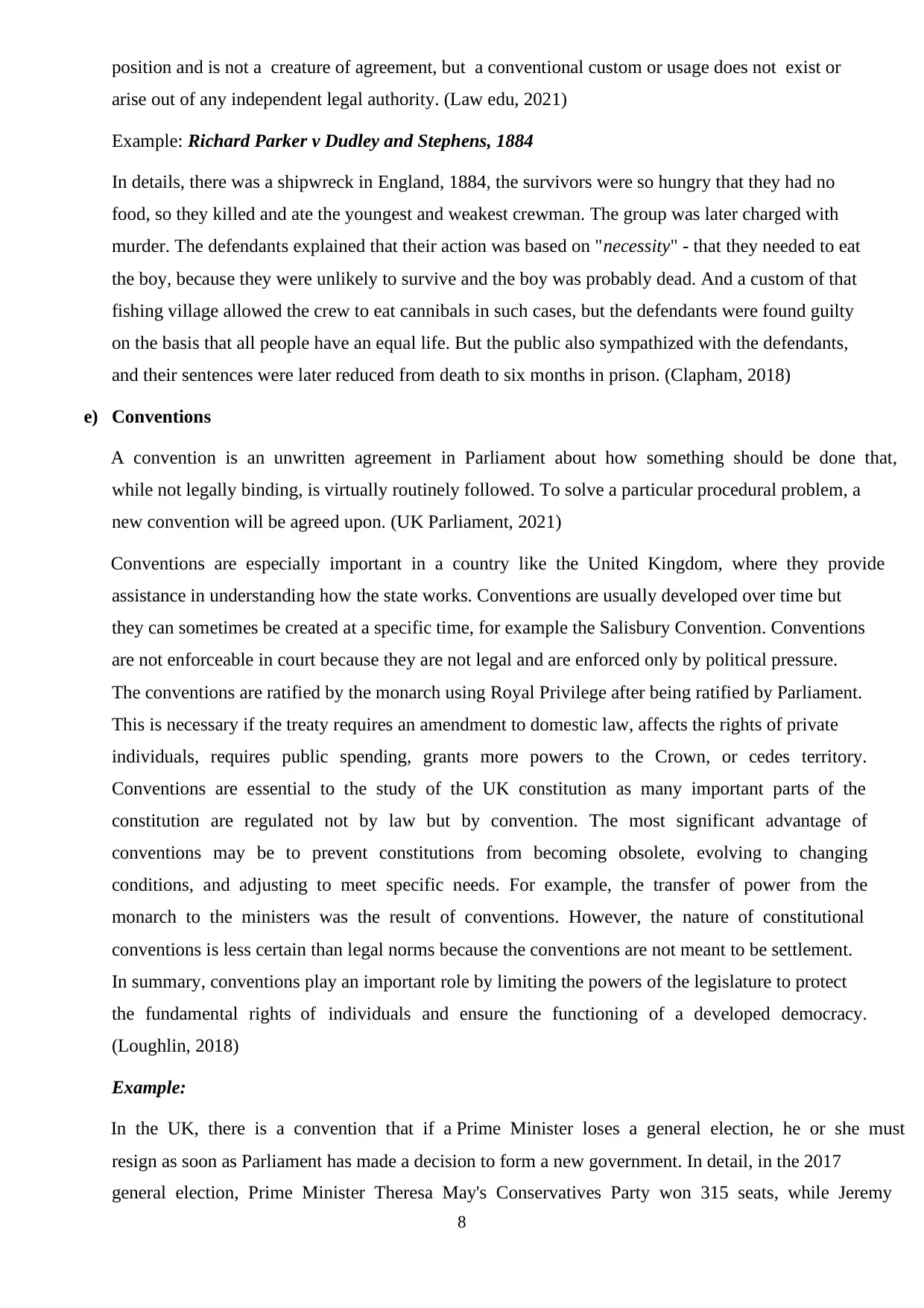
8
position and is not a creature of agreement, but a conventional custom or usage does not exist or
arise out of any independent legal authority. (Law edu, 2021)
Example: Richard Parker v Dudley and Stephens, 1884
In details, there was a shipwreck in England, 1884, the survivors were so hungry that they had no
food, so they killed and ate the youngest and weakest crewman. The group was later charged with
murder. The defendants explained that their action was based on "necessity" - that they needed to eat
the boy, because they were unlikely to survive and the boy was probably dead. And a custom of that
fishing village allowed the crew to eat cannibals in such cases, but the defendants were found guilty
on the basis that all people have an equal life. But the public also sympathized with the defendants,
and their sentences were later reduced from death to six months in prison. (Clapham, 2018)
e) Conventions
A convention is an unwritten agreement in Parliament about how something should be done that,
while not legally binding, is virtually routinely followed. To solve a particular procedural problem, a
new convention will be agreed upon. (UK Parliament, 2021)
Conventions are especially important in a country like the United Kingdom, where they provide
assistance in understanding how the state works. Conventions are usually developed over time but
they can sometimes be created at a specific time, for example the Salisbury Convention. Conventions
are not enforceable in court because they are not legal and are enforced only by political pressure.
The conventions are ratified by the monarch using Royal Privilege after being ratified by Parliament.
This is necessary if the treaty requires an amendment to domestic law, affects the rights of private
individuals, requires public spending, grants more powers to the Crown, or cedes territory.
Conventions are essential to the study of the UK constitution as many important parts of the
constitution are regulated not by law but by convention. The most significant advantage of
conventions may be to prevent constitutions from becoming obsolete, evolving to changing
conditions, and adjusting to meet specific needs. For example, the transfer of power from the
monarch to the ministers was the result of conventions. However, the nature of constitutional
conventions is less certain than legal norms because the conventions are not meant to be settlement.
In summary, conventions play an important role by limiting the powers of the legislature to protect
the fundamental rights of individuals and ensure the functioning of a developed democracy.
(Loughlin, 2018)
Example:
In the UK, there is a convention that if a Prime Minister loses a general election, he or she must
resign as soon as Parliament has made a decision to form a new government. In detail, in the 2017
general election, Prime Minister Theresa May's Conservatives Party won 315 seats, while Jeremy
position and is not a creature of agreement, but a conventional custom or usage does not exist or
arise out of any independent legal authority. (Law edu, 2021)
Example: Richard Parker v Dudley and Stephens, 1884
In details, there was a shipwreck in England, 1884, the survivors were so hungry that they had no
food, so they killed and ate the youngest and weakest crewman. The group was later charged with
murder. The defendants explained that their action was based on "necessity" - that they needed to eat
the boy, because they were unlikely to survive and the boy was probably dead. And a custom of that
fishing village allowed the crew to eat cannibals in such cases, but the defendants were found guilty
on the basis that all people have an equal life. But the public also sympathized with the defendants,
and their sentences were later reduced from death to six months in prison. (Clapham, 2018)
e) Conventions
A convention is an unwritten agreement in Parliament about how something should be done that,
while not legally binding, is virtually routinely followed. To solve a particular procedural problem, a
new convention will be agreed upon. (UK Parliament, 2021)
Conventions are especially important in a country like the United Kingdom, where they provide
assistance in understanding how the state works. Conventions are usually developed over time but
they can sometimes be created at a specific time, for example the Salisbury Convention. Conventions
are not enforceable in court because they are not legal and are enforced only by political pressure.
The conventions are ratified by the monarch using Royal Privilege after being ratified by Parliament.
This is necessary if the treaty requires an amendment to domestic law, affects the rights of private
individuals, requires public spending, grants more powers to the Crown, or cedes territory.
Conventions are essential to the study of the UK constitution as many important parts of the
constitution are regulated not by law but by convention. The most significant advantage of
conventions may be to prevent constitutions from becoming obsolete, evolving to changing
conditions, and adjusting to meet specific needs. For example, the transfer of power from the
monarch to the ministers was the result of conventions. However, the nature of constitutional
conventions is less certain than legal norms because the conventions are not meant to be settlement.
In summary, conventions play an important role by limiting the powers of the legislature to protect
the fundamental rights of individuals and ensure the functioning of a developed democracy.
(Loughlin, 2018)
Example:
In the UK, there is a convention that if a Prime Minister loses a general election, he or she must
resign as soon as Parliament has made a decision to form a new government. In detail, in the 2017
general election, Prime Minister Theresa May's Conservatives Party won 315 seats, while Jeremy
⊘ This is a preview!⊘
Do you want full access?
Subscribe today to unlock all pages.

Trusted by 1+ million students worldwide
1 out of 31
Your All-in-One AI-Powered Toolkit for Academic Success.
+13062052269
info@desklib.com
Available 24*7 on WhatsApp / Email
![[object Object]](/_next/static/media/star-bottom.7253800d.svg)
Unlock your academic potential
Copyright © 2020–2025 A2Z Services. All Rights Reserved. Developed and managed by ZUCOL.